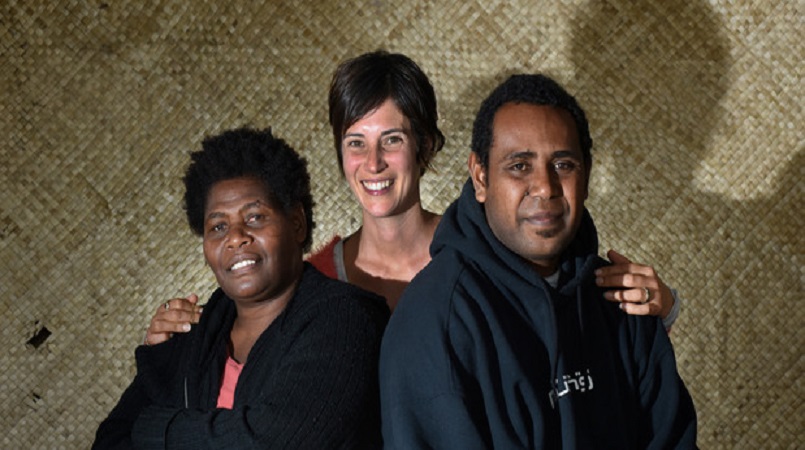
I's just past 1pm Tuesday, and nearly 20 people pack into a Portacom in Ni Van village, which houses seasonal workers from Vanuatu.
Kiwifruit operator Bay Gold offers this makeshift office for Fruit of the Pacific chief executive Kylie DellaBarca Steel. Kylie spends time here each week, teaching workers about issues such as oral health, budgeting, and prevention of conditions such as heart attack, stroke and type two diabetes. Kylie says workers wanted to know how lifestyle affected health. And to learn to use a blood pressure cuff. "It's completely driven by their desire," she says.
With the harvest wrapped, workers have a break from packing and pruning. Ten Ni Vans returned home on June 16. The rest will leave Te Puke in September.
Forty people from Vanuatu are staying at the Bay Gold site as recognised seasonal employer (RSE) workers for three to six months. Marcel Nalau says not only does he earn more money in New Zealand in one season than he could earn in five to 10 years back home, he's also gaining education.
Marcel started learning about oral hygiene in 2010 and is moving on to the next lesson - how diet and exercise affect health. "When we attend those programmes and then go back to Vanuatu, it works really well, because we use our mother language."
Ni Van speak Bislama, a creole language derived from English. Long-time Fruit of the Pacific helper and former dental nurse Mary Charrington has volunteered twice in Vanuatu, and she's seen how locals teach each other. "They probably know more about oral hygiene than most New Zealanders."
Kylie says her mission is empowering locals. The latest example of this empowerment, she says, is sending health champions home next week with ten blood pressure monitors. Ni Vans tell her many locals afraid of seeing a doctor are happy to have a friend take their blood pressure. "It creates access to health knowledge and care at a completely grass roots level."
And Kylie says her team has a chance to help people from all across the Pacific. "Papua New Guinea, Samoa, Solomon Islands, Kiribati... all these people come into our country to support their families and it's an incredible opportunity for us to add value to that process by seeing them as capable individuals and partnering with what their dreams are."
Back at the Portacom, a worker says he wants to do more role playing on rainy days when he's not working. The class has just finished a lesson in using a blood pressure cuff. Already, by reducing salt, sugar and increasing exercise, Kylie sees improvement. "Three weeks ago, there were eight with high blood pressure. Today, there are just two in the group."
James Meramavute says his weight has dropped from 95kg in March, to 82kg today. His blood pressure has improved, too. "I had been getting fat. I've changed my eating habits. Now, I exercise. I'm running and stretching. I can feel a difference in my body." The 40-year-old is looking forward to sharing his story when he returns to Vanuatu in September. "They give me a plan of helping my family to have a change."
Marcel says his Te Puke lessons have instilled the importance of a diet filled with fresh fruit and vegetables. "We really appreciate to attend this programme seriously because Vanuatu is facing problem with this...We hope when we're going back we'll make a big change." Marcel says his community does, in fact, grow fruits and vegetables.
"Our problem is we don't want to eat them," he says. Farmers sell their crops at markets and use the money to buy sugary, salty, fatty Western foods, said volunteers I spoke to.
A World Health Organisation 2016 report said 64 per cent of people in Vanuatu are overweight; 33 per cent are obese. The report said while 13 per cent of the population is diabetic, the country has no national registry for the disease, and insulin is not usually available in primary care practices.
Ni Van Asel Iamak is looking forward to making a difference in her community. "They have to change high blood pressure, because many people died and we didn't know." Asel and Marcel have been teaching their communities about oral health in connection with Fruit of the Pacific since 2010.
These "health champions'' will partner with Marine Reach/Pacific Hope, a medical outreach ship that docks in Tauranga in the offseason. Ni Van volunteers will live aboard the vessel, travelling to Vanuatu islands, giving lessons while medical staff deliver free medical and dental care. Marine Reach medical coordinator Marcos Ruiz says Fruit of the Pacific has made a difference throughout the islands, not just in oral health, but also in leadership development.
"If you know the Ni Vans, they're normally quite shy, and you see what helps in this programme is they're more out there. They're more confident and they come to their own people and are talking to them with authority."
Kylie says there's much to celebrate. The country is rebuilding from last year's cyclone and a partnership between Te Puke residents and Vanuatu natives has helped rebuild houses, businesses and schools, as well as install water systems. Kylie says, "We're also set to receive 600 water filters to distribute through the RSE workers to their families and communities this year." In addition, volunteers will deliver 30,000 toothbrushes and toothpaste the next six months.
Those who leave kiwifruit jobs early, like Marcel and Asel, forgo income to teach. Kylie says they'd love to be paid for that work. "We haven't found funding yet for two people to travel with Marine Reach. We'd only need $5000 to cover their time."
